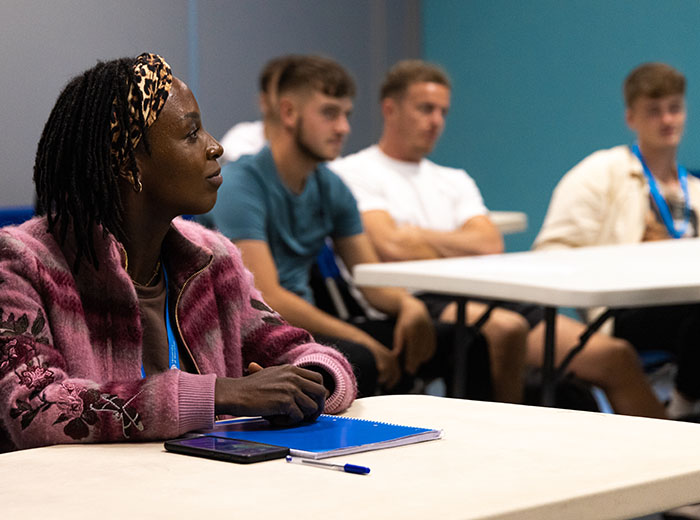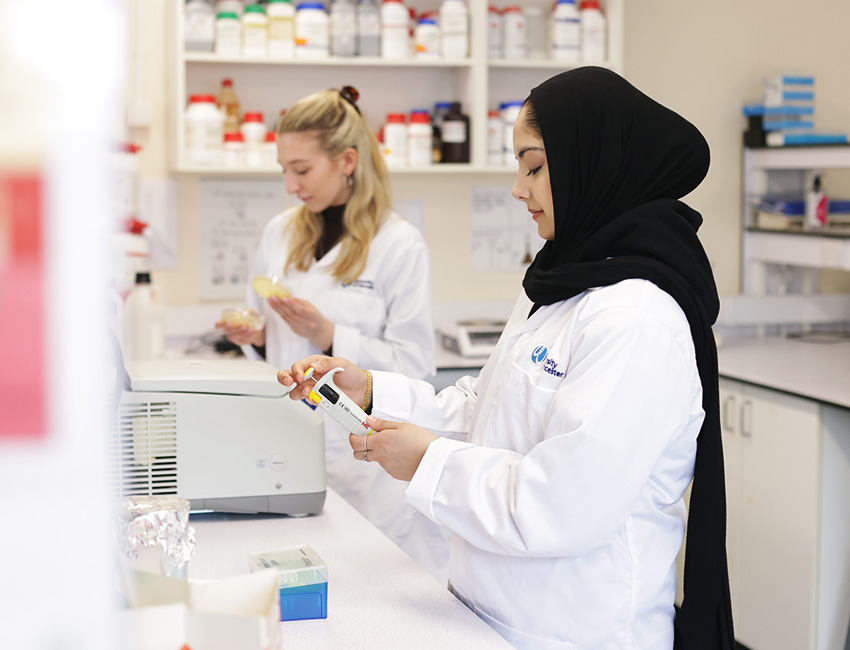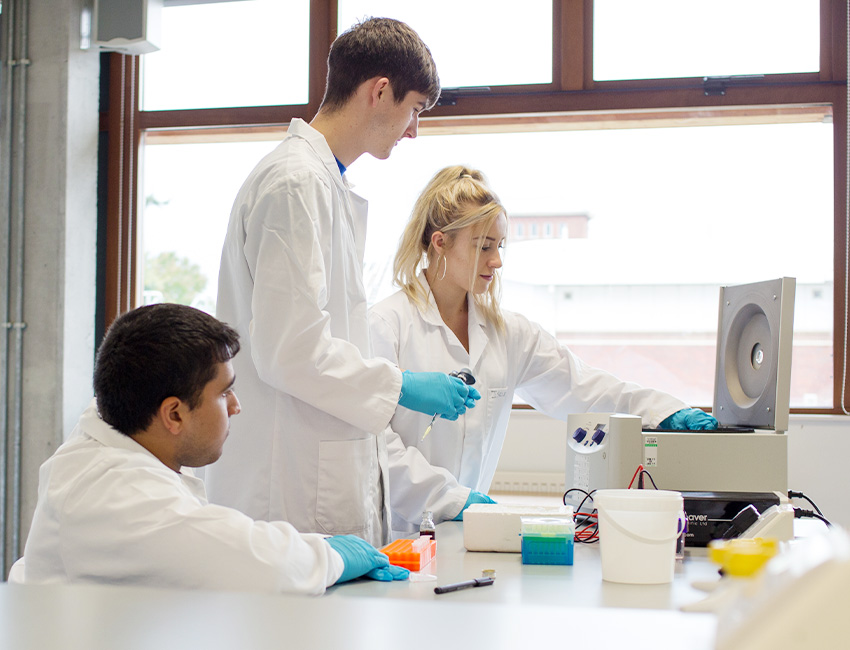At Worcester, you'll be taught by qualified dietitians and will spend at least 1,000 hours completing practical work. You'll be ready for practice after gaining hands-on experience in nutrition planning, patient assessments and practical skills using real-world scenarios.
of students said staff were good at explaining things
of students are in word and/or study 15 months after graduating
This degree is accredited by the British Dietetic Association (BDA) and is approved by the Health and Care Professions Council (HCPC). It leads to eligibility to apply for HCPC registration and follows the core curriculum set out by the BDA.
University of the Year finalist
Recognised for our graduate success, we’re shortlisted for University of the Year in the Times Higher Education Awards 2025.
Overview
Our course covers the science behind healthy living - from food production and nutritional content to how dietary changes can prevent disease or impact pregnancy. You'll develop your communication skills to support others in making healthier choices and improve your people skills through working with our IMPACT members, learning from those with lived experience in health and social care.
Practical teaching is at the heart of our course. You'll engage with workshops, including kitchen sessions to create recipes, food science labs to investigate nutritional content and technical anthropology to investigate the science behind health. You will also complete on-the-job simulations in our clinical skills labs, mock wards and specially converted house, with adapted kitchens, bathrooms and bedrooms. This will prepare you for the various work environments you will encounter.
The experience of studying nutrition with like-minded people in our specialist facilities will fuel your passion for healthy living and provide you with a network of valuable career contacts.
Placement
Our aim is to arrange placements and visits to a diverse range of settings during your three years on the course, so you’ll provide advice for a range of people, in lots of different environments. You may find yourself advising dietary changes to an individual or promoting widespread public health campaigns.
While out on placement you’ll learn from experienced dietitians and have lots of support from your tutors. These practical experiences, in combination with your time on campus, prepare you to be a skilled, motivating and confident dietitian.
Course content
On this accredited course you’ll study theories backed up by substantial evidence, and then get the opportunity to apply this learning in professional practice.
We regularly review our courses to reflect the latest research and developments in the subject area, as well as feedback from students, employers and the wider sector. As a result, modules may change to ensure the course remains current and relevant.
Careers
As a graduate of this programme, you can enter the profession as a registered dietitian.
Nutritionists and dietitians are in demand in a variety of industries, so there are lots of exciting opportunities.
You could:
- Work in a hospital setting
- Support communities to embrace a healthy lifestyle
- Work for public health and support their campaigns
- Work for a professional sports club
- Become self-employed and set-up your own practice
- Move into research or training
You will also gain a science background and develop people skills during this course, making you employable in a wide range of areas.
Course highlights
Teaching and Assessment
We enable you to develop the independent learning capabilities and transferable skills that will equip you for lifelong learning and future employment, as well as academic achievement.
A mixture of independent study, teaching and academic support through the personal academic tutoring system, enables you to reflect on progress and build up a profile of skills, achievements and experiences.
Teaching and assessment contents
Teaching and learning are student-centred, reflecting the philosophy of constructivism whereby students are active participants in their learning experience, and learn with and from each other. Methods of assessment reflect those likely to be encountered in dietetic practice and include assessment of knowledge, skill, application and evaluation in preparation for employment. Interdisciplinary modules at each year allow students to learn alongside occupational therapy and physiotherapy students to reflect real-world working.
Examples of learning and teaching methods used include:
- Lead lectures
- Practical classes and immersive simulation
- Seminars
- Tutorials
- Kitchen practical sessions
- Scientific laboratory sessions
- Problem-solving and group work
- Oral presentations
- Use of e-learning (pre-reading, pre-recorded lectures, self-assessment quiz, online discussions and synchronous virtual sessions)
- Case study-based scenarios.
Learning in the university setting is complimented by practical and clinical skill development, using the skills and simulation suite, Ability House (a simulated home setting), a large teaching kitchen and science labs. Valuable learning opportunities are provided using service users/carers and other professionals in both teaching and assessment strategies at all levels. With opportunities for interprofessional learning both within the university and the clinical practice setting, including during simulated practice where students work with a range of professionals including occupational therapists, physiotherapists, nurses and social workers.
Meet the team
These are just some of the lecturers who will be teaching on this course.
Entry requirements
UCAS tariff points required: 120
| Qualification | Grade |
|---|---|
| A-level | BBB |
| BTEC National Extended Diploma | DDM |
| T-level | Merit |
We do accept Access to HE Diplomas and other qualifications which may not exactly match the combinations above. Work out your estimated points with the UCAS tariff calculator.
Any questions?
If you have any questions about entry requirements, please call our Admissions Office on 01905 855111 or email admissions@worc.ac.uk.
Fees
Fees contents
UK and EU students
In 2026/27 the standard fee for full-time home and EU undergraduate students on BA/BSc/LLB degrees and FdA/FdSc degrees is £9,535 per year (subject to changes in the government tuition fee cap).
Tuition fees are reviewed annually and may increase each year for both new and continuing students.
For more details on course fees, please visit our course fees page.
International students
In 2026/27 the standard tuition fee for full-time international students enrolling on BA/BSc/LLB degrees and FdA/FdSc degrees is £17,200 per year.
Tuition fees are reviewed annually and may increase each year for both new and continuing students.
For more details on course fees, please visit our course fees page.
How to apply
How to apply contents
Applying through UCAS
UCAS is the central organisation through which applications are processed for full-time undergraduate courses in the UK.
Read our how to apply pages for more information on the application process, or if you’d like to apply for part-time study.
Nutrition and Dietetics BSc (Hons) - B4D1
Contact
If you have any questions, please get in touch. We're here to help you every step of the way.

Admissions Office
admissions@worc.ac.uk01905 855111More to explore
Open Days
Visiting us is the best way to get a feel for student life at the University of Worcester.

The City of Worcester
Worcester is a welcoming university city with great transport links and plenty of student parking.

Accommodation
Benefit from our accommodation guarantee. We have rooms on campus to suit every budget including en-suite options.













